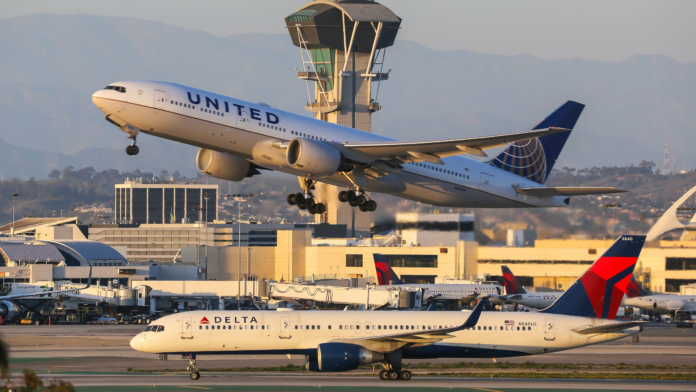The United States Government, namely the Department of Justice ( DOJ) and the Department of Transportation ( DOT), has launched a study into the state of air travel in the US, with the goal of collecting as much information as possible about consolidation and other competition-related factors from stakeholders.
Issues affecting the availability and affordability of air travel
In a statement on October 24, the DOJ and DOT said that it launched a public inquiry in the form of a request for information (RFI) to seek input from stakeholders about consolidation, anticompetitive conduct, and other issues affecting the availability and affordability of air travel.
Photo: EQRoy | Shutterstock
The RFI covers previous airline mergers, exclusionary conduct, airport access, aircraft production, ticket sales, pricing, reward practices, and aviation workers’ experience, the statement added.
“All market participants are invited to provide comments in response to this RFI, including passengers, consumer advocates, pilots, in-flight and ground crews, airport authorities, employers, airlines, private and charter aircraft operators, travel agents, trade groups, industry analysts, purchasers of corporate travel services, and other entities that provide or rely upon air travel services.”
The two agencies invited the public to comment on the RFI until December 23, with the filing already receiving a single comment.
More opportunities for good, affordable air travel
Jonathan Kanter, the assistant attorney general of the DOJ’s Antitrust Division, said that competition in the airline industry was the driver of better quality, fares, and choices for Americans.
“With this inquiry, we hope to learn more from the businesses and travelers at the center of this essential industry.”
Photo: Wenjie Zheng | Shutterstock
Kanter noted that their feedback will ensure the DOJ can continue protecting competition in air travel.
Pete Buttigieg, the Transportation Secretary of the US, added that Americans have relied on air transport to visit friends or family, explore the country, and travel for work.
“Good service and fair prices depend on ensuring that there is real competition, which is especially challenging for the many American communities that have lost service amid airline consolidation.”
Buttigieg concluded that the two departments’ goal was to identify and remove potential barriers to competition, enabling more Americans to access opportunities based on good and affordable air services.
Related Low-Cost Carriers Make Up Just 34% Of US Airline Capacity The US has the world average for low-cost and legacy capacity mix, with low-cost carriers growing faster than legacy full-service carriers.
Changing antitrust policies
Both agencies highlighted their recent work, including the dismantling of American Airlines and JetBlue’s Northeast Alliance (NEA), a successful lawsuit to block the JetBlue and Spirit Airlines merger, and having ensured that the traveling public, rural communities, and smaller airlines are protected following the Alaska Airlines and Hawaiian Airlines merger.
The more aggressive stance against mergers and alliances has been part of the policies of Joe Biden, the current President of the United States. In July 2021, Biden issued an executive order titled ‘Executive Order on Promoting Competition in the American Economy.’
According to the White House’s statement, while the economy has boomed since Biden took office, a smaller number of large companies controlled more of the market than they did 20 years ago.
“[…] promote competition in the American economy, which will lower prices for families, increase wages for workers, and promote innovation and even faster economic growth.”
Photo: Delta Air Lines
According to Bureau of Transportation Statistics (BTS) data, between August 2023 and July, Delta Air Lines was the largest domestic airline in the US, with a market share of 17.7%. Two other airlines were in the 17th percentile, Southwest Airlines (17.5%) and American Airlines (17.4%).
United Airlines was the fourth airline in terms of market share, measured in revenue passenger miles (RPM), with the airline controlling 15.9% of the market. The Alaska Airlines and Hawaiian Airlines entity, which will be operating under a single air operator’s certificate (AOC), would combine for a 7.7% market share in July.
US Government Launches Probe Into Airline Competition
RELATED ARTICLES



